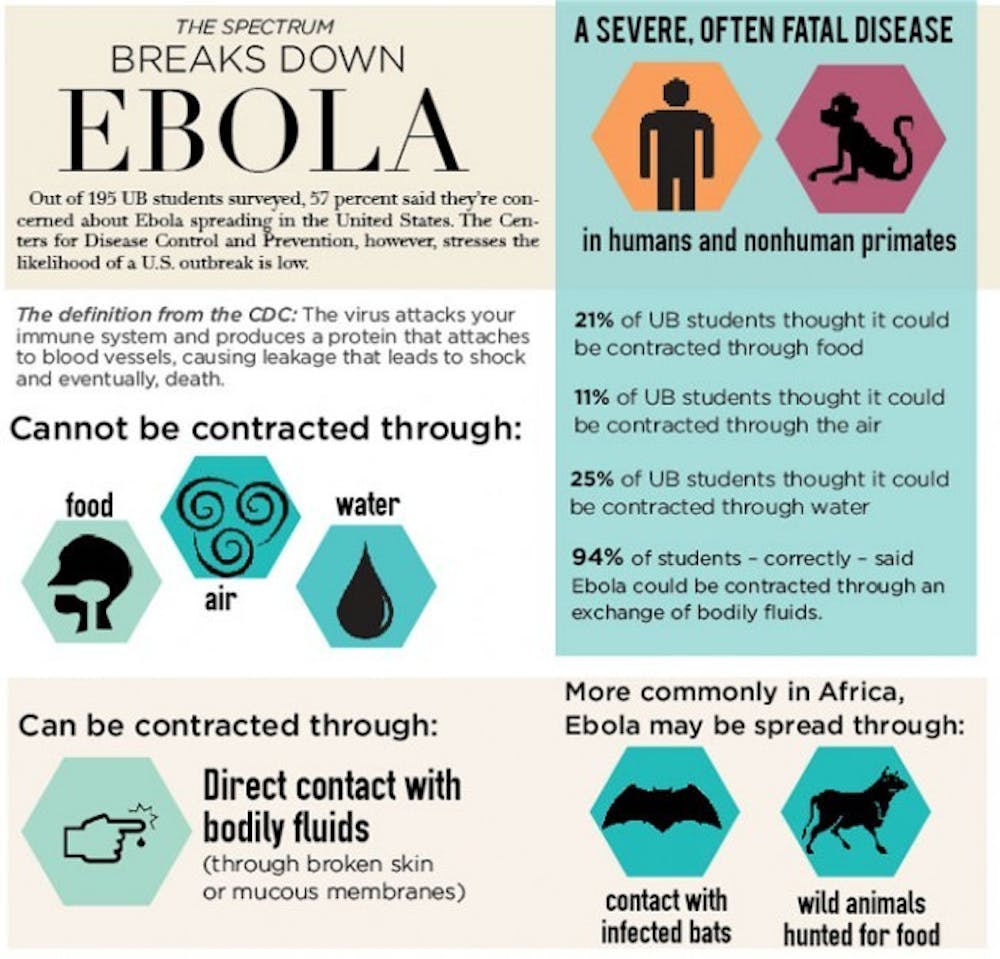Out of 195 students surveyed, 57 percent said they’re concerned about Ebola spreading in the United States.
The Centers for Disease Control and Prevention, however, stresses the likelihood of a U.S. outbreak is low.
In light of the recent case of Amber Vinson, a second nurse from Dallas who contracted Ebola and is quarantined in Atlanta, students have taken notice of how the virus can be contracted and spread, especially in America. But many – according to a Spectrum survey – don’t understand the disease fully.
Ebola is a severe and fatal disease that can be transmitted through the exchange of bodily fluids. Some signs or symptoms are a fever greater than 101.5 degrees Fahrenheit, severe headache, muscle pain, vomiting, diarrhea and unexplained hemorrhaging and bruising. Symptoms can appear anywhere from 2-21 days after exposure, but the patient is not contagious until the symptoms are shown.

When asked how Ebola could be contracted in the survey, students incorrectly believed the following: 11 percent of students said the virus is airborne, 25 percent thought it could be contracted through water and 21 percent said Ebola could be contracted through food. Ninety-four percent of students – correctly – said Ebola could only be contracted through an exchange of bodily fluids.
In 1976, the Ebola virus was first discovered in the Democratic Republic of Congo. Today, Ebola is most active in Sierra Leone, Liberia and Guinea. As of Oct. 15, there were 8,997 total cases of Ebola and 4,493 deaths, according to the CDC.
Derek Taylor, a UB professor of biological sciences, has done extensive research on the virus. He, along with his colleagues, concluded that Ebola viruses are extremely old and have split off from other viruses at least 20 million years ago, when it affected rodents and mammals, Taylor told The New York Times.
The growing concern of the Ebola outbreak makes some students like Jacob Silverman, a freshman undecided major, apprehensive about traveling abroad.
Anthony Jillson, a junior film major, however, is not worried about Ebola spreading in the United States.
Yusra Khawaja, a junior accounting major, is concerned with the spread of the virus. She thinks students are not well informed about the disease because it’s one the public still learning about.

On Friday, the Honors College held an InFocus discussion on the current Ebola epidemic. Students who participated in the conversation shared their thoughts about the fear of Ebola in the world and how the world is responding.
Some students, like Patrick Ahlers, a freshman business major, aren’t concerned about a possible widespread outbreak in the United States, saying the CDC has the virus under control.
William Goodridge, a freshman computer science major, and Ahlers are not concerned with traveling unless they are traveling to the areas the virus is most widespread.
UB posted a frequently asked questions on the students’ health services website, saying the risk of exposure in Buffalo is very low.
At the start of the semester, students from Ebola-affected countries received additional health screenings from the university. UB conducted a review that indicated no faculty or staff members have been in West Africa since the outbreak.
Student Health Services also partnered with UB Campus Living to educate the resident hall staff on symptoms of the virus.
Susan Snyder, the director of Student Health Services, said UB has plans in place for all types of emergencies, including infectious illnesses. She said the Erie County Health Department would lead protection procedures if Ebola affected the UB community firsthand.
Emma Janicki contributed reporting to this story
email: news@ubspectrum.com





